Indian strategy aims to build ports in region to augment its maritime and also security interests.
India’s domain in the Indian Ocean is driving it to not only expand its maritime trade but also its security interests, particularly in context of China building a vast network of both sea and land connections with the region through its Belt-and-Road Initiative (BRI).
Still in early March, the Sri Lankan Government agreed to give the development of Colombo Port’s West Cargo Terminal (WCT) to India and Japan. While Japan had not announced till recently the name of its developer for the project, India’s main port developer, Adani Ports & Special Economic Zone Ltd. (APSEZ) which has been engaged in port and infrastructure development in many regions, announced that it will implement the WCT project.
In a press release, APSEZ said that it had received a Letter of Intent (LOI) from the Sri Lankan Ministry of Ports and Shipping and the Sri Lanka Ports Authority, “pursuant to approval from the Sri Lankan Cabinet of Ministers for the development and operations of West Container Terminal (WCT) in Colombo, Sri Lanka.”
APSEZ CEO Karan Adani said that the project was a “continuation of the deep and mutually beneficial strategic relationship between two neighboring nations whose history is deeply intertwined.”

APSEZ’s Regional Reach
APSEZ has been recently in the news in the U.S., though for a different reason: the S&P Dow Jones indices said that it was removing APSEZ because of its alleged business ties with Myanmar’s military which faces charges of human rights’ abuses after a military coup this year. APSEZ is building a $298 million port in Yangon on land leased from the military-backed Myanmar Economic Corporation (MEC).
The APSEZ will join forces with John Keells Holdings and the Sri Lanka Port Authority (SLPA) to develop Colombo Port’s WCT on a “Build-Operate-and-Transfer”(BOT) basis for a period of 35 years. Indian experts told the American Journal of Transportation that they see APSEZ’s involvement in the port development as a “logical extension” of Adam’s involvement in Sri Lankan transshipment activity. An APSEZ spokesman said that 45% of Colombo’s transshipment volumes originated from or destined to an Adani Port’s terminal in India where it maintains an extensive network.
The APSEZ will be the first Indian port operator in Sri Lanka, and will hold 51% in the terminal partnership; the WCT is expected to be developed to its final capacity of 1.5 million TEUs with a quay length of 1400 meters and an alongside depth of 20 meters.
Adani sources describe the project implementation as a “win-win situation”, considering that the network impact of this partnership will be “significant and multiply and accelerate the transshipment options that will become available to various shipping lines and other potential port customers across the South Asian waters benefitting both India and Sri Lanka in multiple ways”.
Indian officials say that connectivity is an important element in context of regional integration and bilateral relations. This was also a theme advocated by India for the 14th Summit of the regional South Asian Association for Regional Cooperation (SAARC) comprising Afghanistan, Bangladesh, Bhutan, India, the Maldives, Nepal, Pakistan and Sri Lanka.
APSEZ was also selected for developing the East Container Terminal as part of a 2020 trilateral pact between India, Japan and Sri Lanka.
Sri Lankan Government spokesman Kehehya Rambukwella said the government was allowing foreign participation in the West terminal which requires large investment for development.
India, which sees the Indian Ocean region as its strategic backyard, has for years been worried by rival China’s growing economic and political influence in neighboring Sri Lanka.

China’s Port Pacts
China considers Sri Lanka to be a critical link in its massive “Belt and Road” global infrastructure building initiative and has provided billions of dollars in loans for Sri Lankan projects over the past decade. The projects include a seaport, airport, port city, highways, and power stations.
China already operates the Colombo International Container Terminal as a joint venture with the Sri Lanka Ports Authority. Critics say the Chinese-funded projects are not financially viable and that Sri Lanka will face difficulty in repaying the loans.
In 2017, Sri Lanka leased a Chinese-built port located near busy shipping routes to a Chinese company for 99 years to end the heavy burden of repaying the Chinese loan used to build it. The facility is part of Beijing’s plan for a line of ports stretching from Chinese waters to the Persian Gulf.




